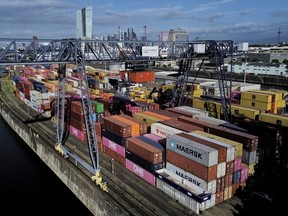
Article content
BERLIN (AP) — The German economy, Europe’s biggest, grew by 0.4% in the first quarter thanks to stronger-than-expected exports and manufacturing, official data showed Friday. That was double the growth initially estimated.
THIS CONTENT IS RESERVED FOR SUBSCRIBERS ONLY
Subscribe now to read the latest news in your city and across Canada.
- Exclusive articles from Barbara Shecter, Joe O'Connor, Gabriel Friedman, and others.
- Daily content from Financial Times, the world's leading global business publication.
- Unlimited online access to read articles from Financial Post, National Post and 15 news sites across Canada with one account.
- National Post ePaper, an electronic replica of the print edition to view on any device, share and comment on.
- Daily puzzles, including the New York Times Crossword.
SUBSCRIBE TO UNLOCK MORE ARTICLES
Subscribe now to read the latest news in your city and across Canada.
- Exclusive articles from Barbara Shecter, Joe O'Connor, Gabriel Friedman and others.
- Daily content from Financial Times, the world's leading global business publication.
- Unlimited online access to read articles from Financial Post, National Post and 15 news sites across Canada with one account.
- National Post ePaper, an electronic replica of the print edition to view on any device, share and comment on.
- Daily puzzles, including the New York Times Crossword.
REGISTER / SIGN IN TO UNLOCK MORE ARTICLES
Create an account or sign in to continue with your reading experience.
- Access articles from across Canada with one account.
- Share your thoughts and join the conversation in the comments.
- Enjoy additional articles per month.
- Get email updates from your favourite authors.
THIS ARTICLE IS FREE TO READ REGISTER TO UNLOCK.
Create an account or sign in to continue with your reading experience.
- Access articles from across Canada with one account
- Share your thoughts and join the conversation in the comments
- Enjoy additional articles per month
- Get email updates from your favourite authors
Sign In or Create an Account
or
Article content
Article content
The Federal Statistical Office had reported at the end of last month that the economy expanded by 0.2% in the January-March period compared with the previous quarter. The head of the office, Ruth Brandt, said that “the surprisingly good economic development seen in March” led to the revision.
Article content
Article content
The last time Germany saw stronger growth was in the third quarter of 2022, when gross domestic product expanded by 0.6%. Germany has struggled to generate significant growth for years and the economy shrank in each of the last two years. In last year’s fourth quarter, it contracted by 0.2%.
Article content
By signing up you consent to receive the above newsletter from Postmedia Network Inc.
Article content
In its first forecast since new Chancellor Friedrich Merz’s government took office earlier this month, the government’s panel of independent economic advisers predicted on Wednesday that GDP will stagnate this year and grow by 1% next year.
Article content
It pointed to headwinds from U.S. President Donald Trump’s tariffs and trade threats, but said a huge infrastructure investment package put together by Merz’s coalition offers opportunities for an improvement next year.
Article content
Carsten Brzeski, global chief of macro at ING bank, said the improved first-quarter showing looks set to be “a positive one-off” at least in the short term, fueled by businesses trying to get ahead of Trump’s tariffs.
Article content
“As a result of the announced tariffs and in anticipation of ‘Liberation Day,’ German industrial production and exports surged in March,” Brzeski said in a research note.
Article content
Advertisement 1

.jpg) 6 hours ago
1
6 hours ago
1
 English (US)
English (US)